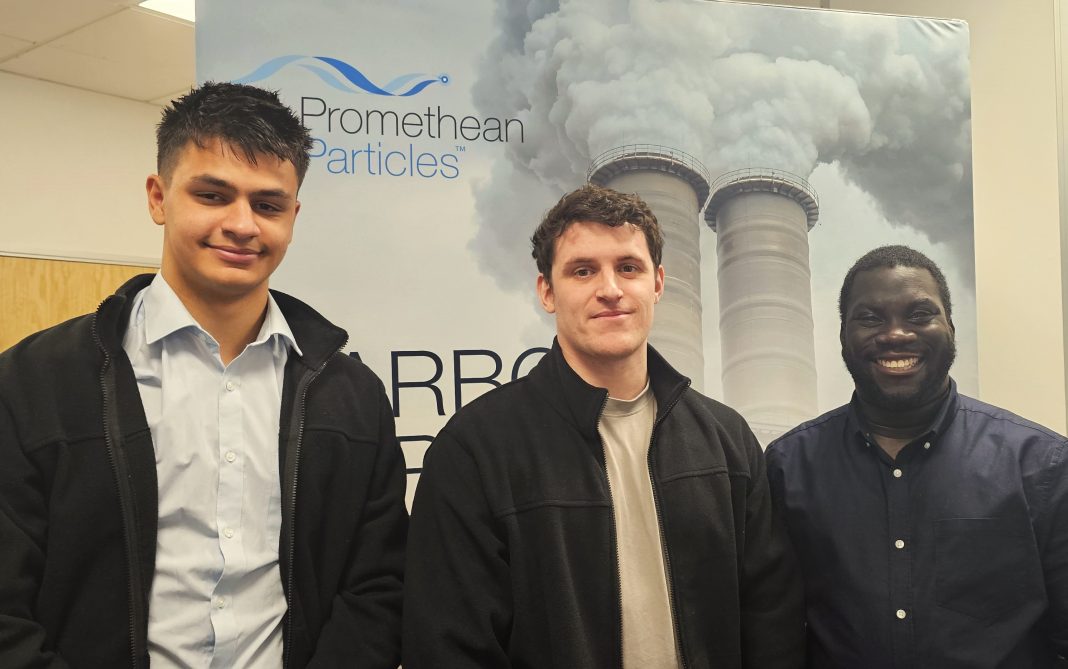A Nottingham chemical manufacturing firm has responded to increasing demand for its products by creating new office space and taking on three new members of staff.
Promethean Particles has converted a mezzanine storage area at its site in Midland Way, adding 62m2 of open plan office space to the building, which now contains 16 additional desks.
The latest appointments – in the shape of synthetic chemist Andy Jones, process development engineer David Van Gelder Adjar and process engineer James Dales – bring the company’s headcount up to 17 – virtually double the number of staff at this time last year.
The expansion brings to a close a pivotal year for Promethean Particles, which is leading the UK in increasing the production volumes of a class of advanced materials called MOFs – which stands for metal-organic frameworks – in cost-effective ways.
MOFs are tiny crystal structures which have extremely large internal surface areas and can be used for a variety of purposes, including trapping carbon dioxide (CO2) created by the burning of industrial fuels.
Promethean Particles has patented a unique method for producing them cost-effectively in large quantities, while also helping to develop them for carbon capture and other industrial uses.
Andy joined the company having completed his PhD in sustainable chemistry at the University of Nottingham, and previously studied at the University of York.
Both universities have green chemistry centres promoting sustainable principles and joining Promethean Particles, which is pioneering technology originally developed at Nottingham, is a dream step for Andy.
He said: “My PhD involved making MOFs so when I saw a role was available at Promethean Particles as a synthetic chemist with a focus on MOFs, I couldn’t quite believe it.
“My role at the company is to help develop scalable and cost-effective ways of producing high-quality MOFs at lab-scale, which can then be scaled-up beyond the lab by our engineering and operations team.
“MOFs have been reported academically for several decades, but they’ve only really gained traction in industry over the past 15 years or so, so this is certainly a very good time for me to be working here.”
David previously worked as a technology project and process engineer in the lubricants industry before seeking a new a challenge.
He said: “My work bridges the gap between our R&D and operations functions to ensure our manufacturing processes are scaled-up safely, efficiently and cost-effectively, all while maintaining high product quality.
“I enjoy this type of work because it gives me the opportunity to bring new ideas into a company that is doing something different and revolutionary.”
James Dale is taking a year out of his degree course at the University of Nottingham, where he is studying chemical and environmental engineering, to work as a process engineer.
The company appealed to him because one of his lecturers, Ed Lester, is Promethean Particles’ founder and chief scientific officer, and James wanted to work at the firm which was putting Ed’s innovation into practice.
At the company, James is working with prototype carbon capture units that contain MOFs, where he is gathering data to inform on how the technology can be used at industrial scale to achieve decarbonisation goals.
He said: “MOFs are in the early stages of their commercialisation journey, but they’re very exciting materials.
“While I’ve been primarily working on carbon capture, MOFs can be used for many different applications, including water harvesting, so I’m interested to see where else they can be used in the future.”
James Stephenson, chief executive officer of Promethean Particles, said: “We have had an incredibly exciting year and it’s been wonderful to see our new office space taking shape while welcoming three more new starters to the team.
“Our company has grown significantly during 2024. We closed a £8 million investment round and we have created an extraordinary amount of interest in MOFs and our proprietary manufacturing process this year.
“In particular we have been contacted by organisations which need to limit their carbon emissions and companies which design and manufacture the equipment which would be used to house the MOFs when they are eventually put to use.”



